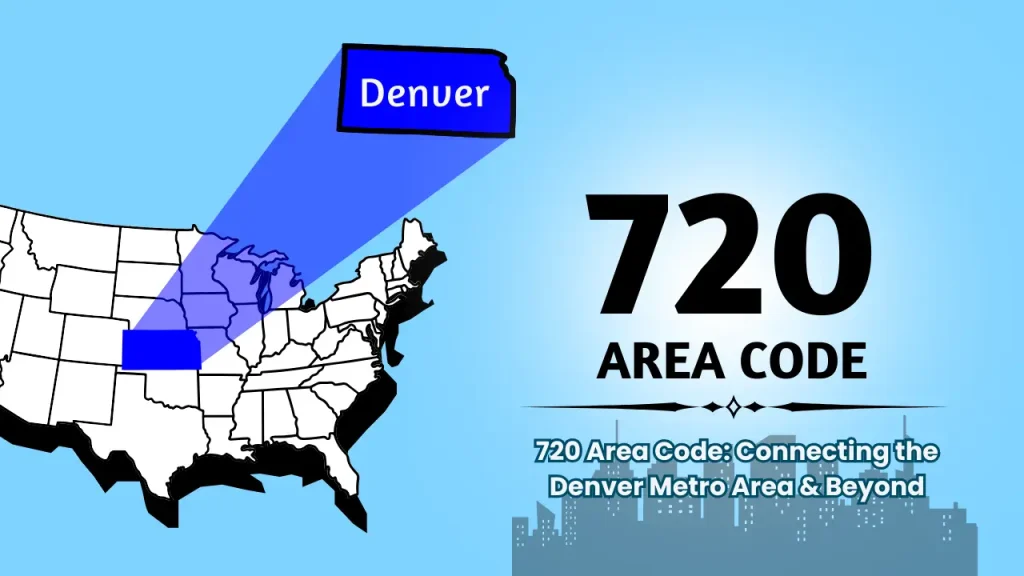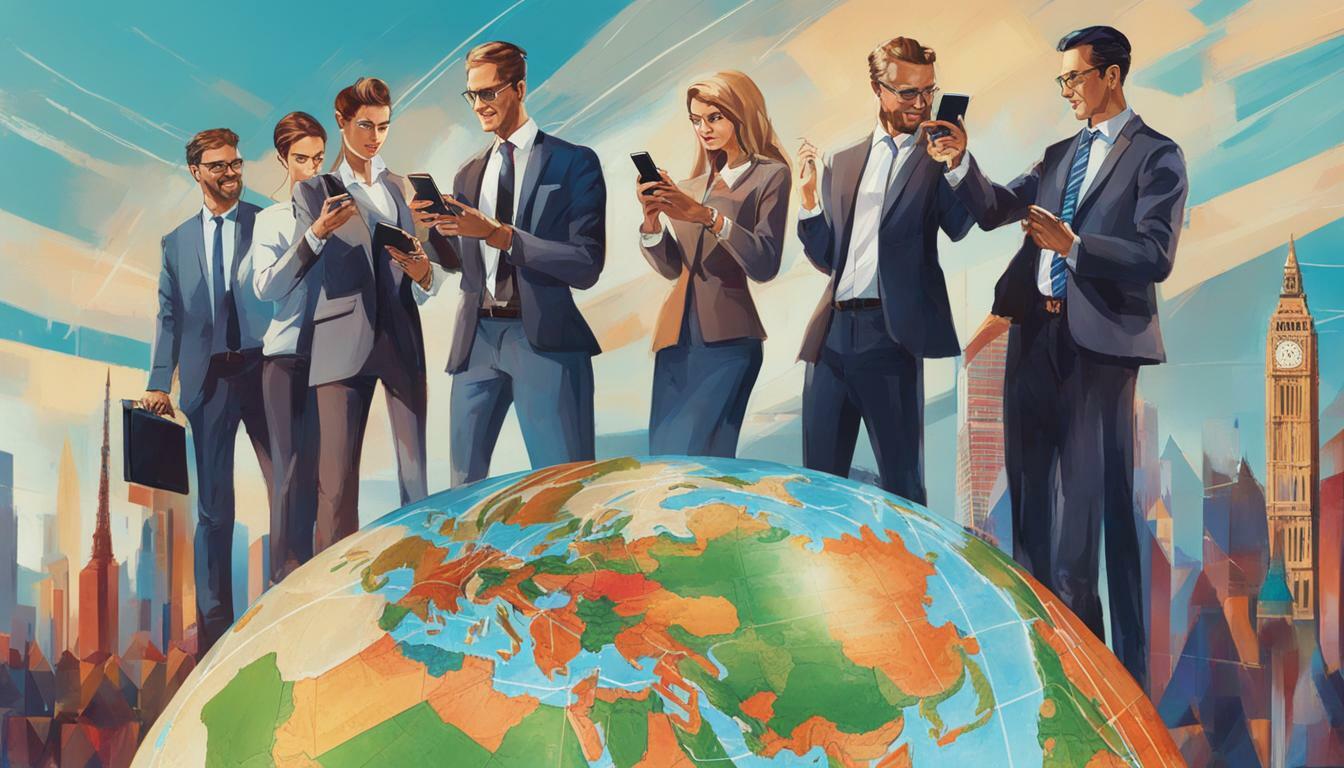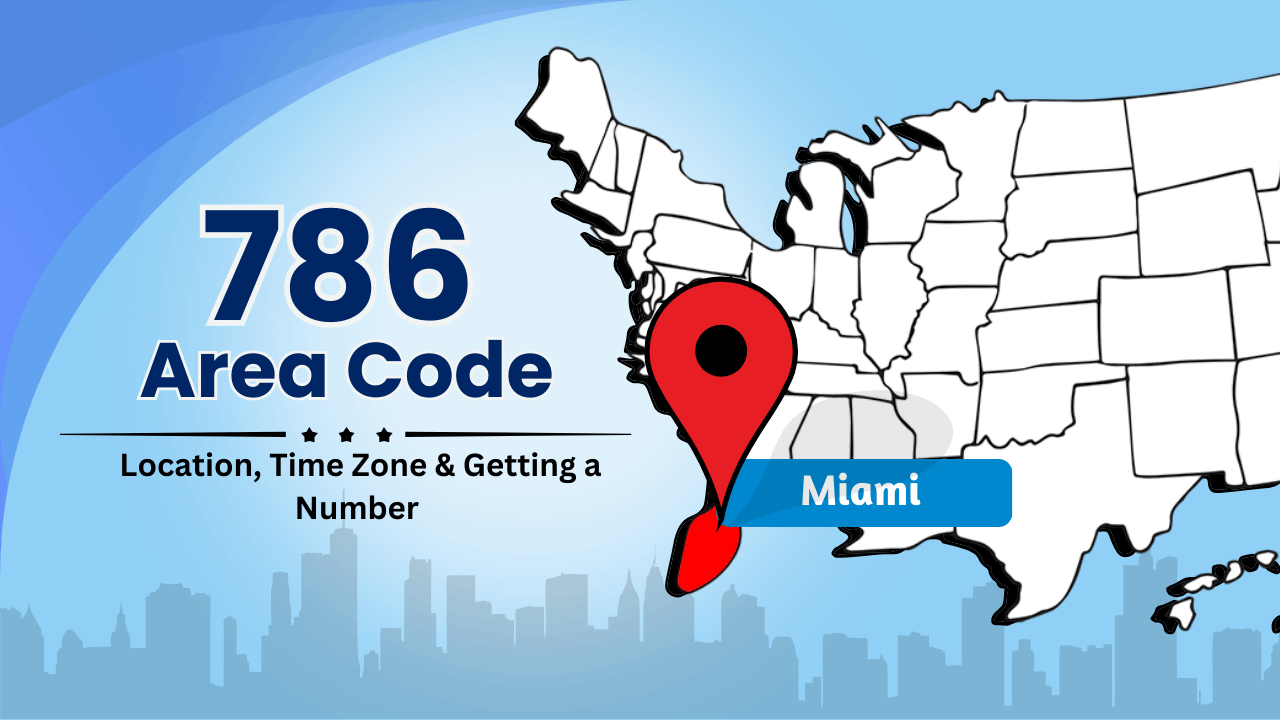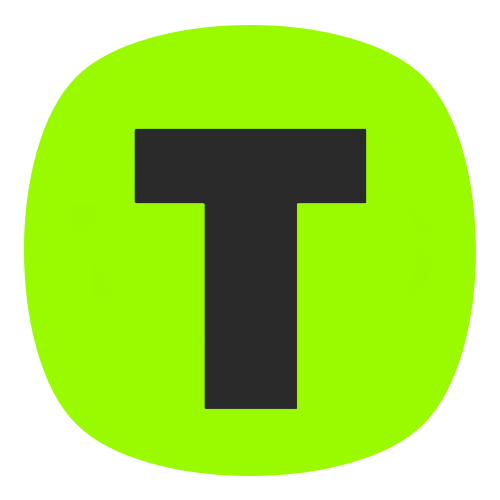Introduction
The 720 area code is a vital component of the telecommunications network serving the vibrant Denver metropolitan area and surrounding communities in Colorado. As an overlay to the original 303 area code, and now sharing the region with the newer 983 overlay, 720 plays a crucial role in accommodating the region’s rapid growth and ensuring residents and businesses stay connected along the Front Range.
Understanding the significance of the area code 720 involves recognizing its part in the economic engine and social landscape of the greater Denver region. From the bustling streets of Downtown Denver to the tech hubs in Boulder and the sprawling suburbs like Aurora and Lakewood, this area code facilitates communication across a diverse and dynamic landscape. Businesses leverage this local identity, while residents maintain connections within their communities.
Denver’s phone systems have evolved significantly to keep pace with demand. The 720 area code, introduced in the late 1990s, marks a key point in that evolution, reflecting the area’s transformation into a major economic and cultural center.
Key Takeaways
- The 720 area code is essential for communication in the Denver metro area, including Boulder and Aurora.
- It functions as an overlay for the 303 area code and shares the region with the 983 area code.
- It provides economic advantages for businesses establishing a local presence.
- The area code is intertwined with the region’s dynamic culture and growth.
Why the 720 Area Code is Important for Denver
The 720 area code is fundamental to the communication infrastructure of the Denver metropolitan area and nearby cities along Colorado’s Front Range. It covers a significant and densely populated region, including Denver itself, Boulder, Aurora, Lakewood, Littleton, Englewood, and Centennial.
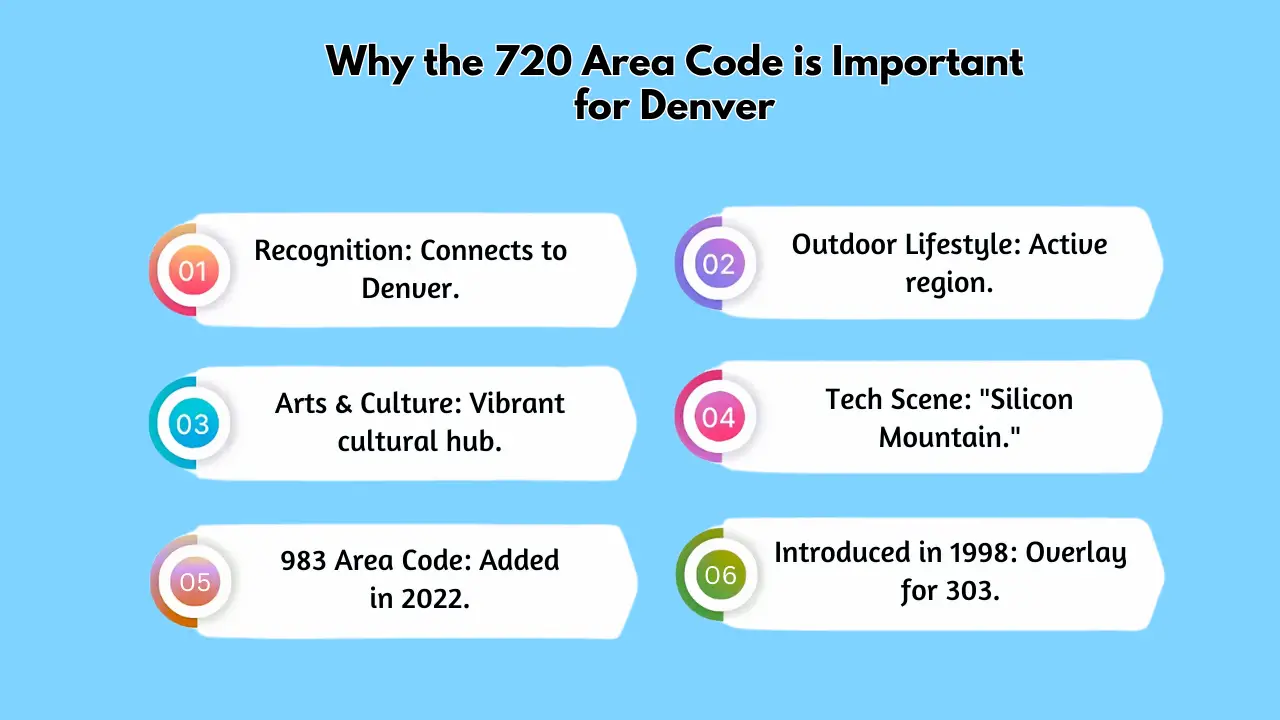
As an overlay code for the original 303 area code, 720 was introduced in 1998. This structure allowed for a massive expansion of available phone numbers to meet surging demand fueled by population growth and the rise of mobile devices, without requiring existing 303 users to change their numbers. Subsequently, the 983 area code was introduced in 2022 as an overlay for the same geographic area, further increasing number availability.
The 720 code helps delineate and connect the diverse communities within the greater Denver area. This region is known for its stunning Rocky Mountain backdrop, thriving tech scene (“Silicon Mountain”), vibrant arts and culture, and an active outdoor lifestyle. A 720 number signifies belonging to this energetic and growing part of Colorado.
For businesses, area code 720 provides local credibility and links them directly to the well-established and economically robust Denver market. Associating with this area code can enhance trust and recognition among local customers in a region known for innovation, tourism, and a high quality of life.
For individuals, a 720 number represents a connection to their local community, whether they reside in the urban core, the surrounding suburbs, or university towns like Boulder. It’s part of the local identity in one of America’s fastest-growing and most desirable metropolitan areas.
Overview of the Area Code 720
Area code 720 is integral to Colorado’s Front Range Urban Corridor, serving alongside area codes 303 and 983. Its introduction was a direct response to the need for more telephone numbers in this rapidly expanding region.
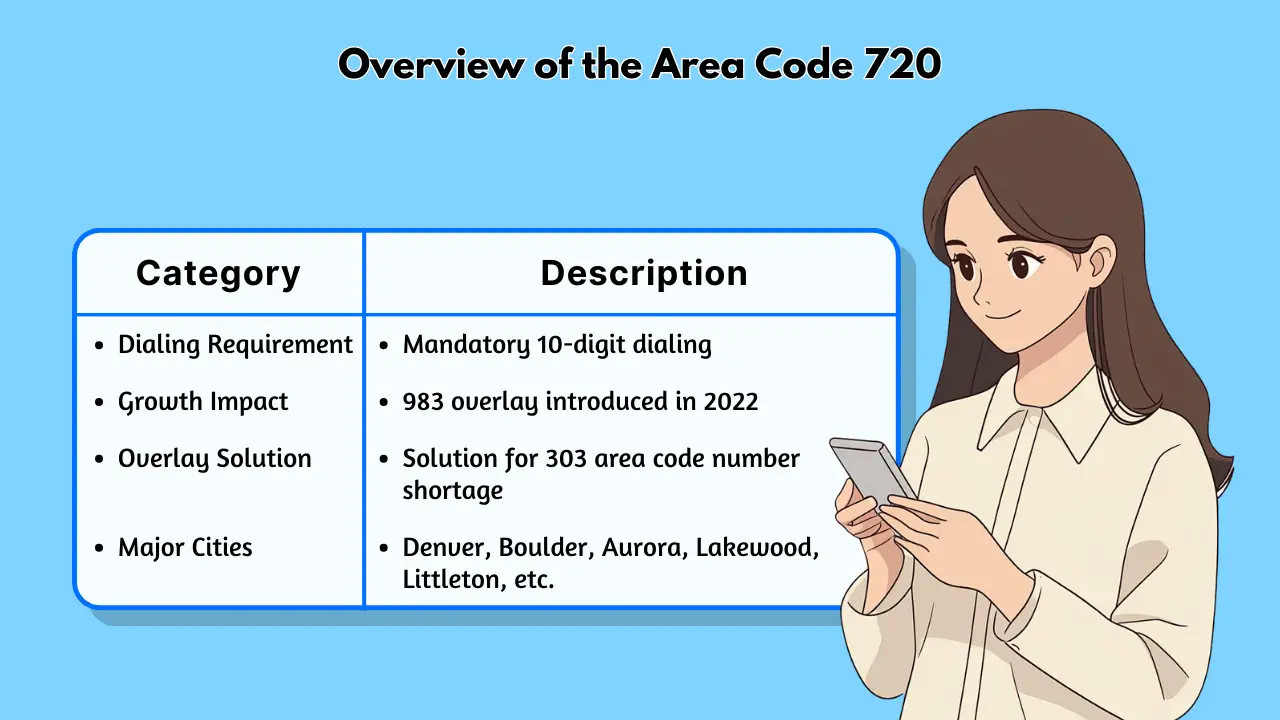
| Category | Description |
| Location | Denver Metro Area & surrounding cities, Colorado |
| Overlays | Overlays 303; Is overlaid by 983 |
| Introduction | June 1, 1998 |
| Time Zone | Mountain Time Zone (MT): GMT -07:00 / -06:00 (DST) |
| Major Cities | Denver, Boulder, Aurora, Lakewood, Littleton, Centennial, Englewood, Longmont |
| Industries | Technology, Aerospace, Telecommunications, Healthcare, Tourism, Craft Beer, Cannabis, Government |
Geographical Location
The 720 region covers a significant portion of North Central Colorado, centered around the state capital, Denver. It encompasses Denver County and parts of Adams, Arapahoe, Boulder, Broomfield, Douglas, Elbert, Gilpin, Jefferson, Park, and Weld counties. This includes major population centers like Aurora, Lakewood, and Boulder, as well as numerous smaller cities and towns integrated into the metropolitan fabric. Because it’s an overlay, 720 shares the exact same geographic boundaries as the 303 and 983 area codes.
History and Implementation
Area code 720 was officially put into service on June 1, 1998. It was created as an overlay for the 303 area code, which had served as Colorado’s original, statewide area code until splits began in the late 1980s. By the mid-1990s, the proliferation of cell phones, pagers, and internet connections exhausted the available numbers within 303 in the Denver metro area.
The overlay solution meant that new numbers could be assigned with the 720 region within the same geographic region as 303. A key consequence was the implementation of mandatory 10-digit dialing for all local calls within the 303/720 zone. Due to continued growth, the 983 area code was later added as another overlay covering the same territory, starting in April 2022.
Time Zone Information
The entire 720 region operates within the Mountain Time Zone (MT). It observes Mountain Standard Time (MST), which is GMT -07:00, and Mountain Daylight Time (MDT), which is GMT -06:00, during daylight saving time (typically from mid-March to early November). Awareness of this time zone is crucial for scheduling calls and conducting business, especially with contacts outside the region.
Economic Benefits of the Area Code 720: Why It Matters for Businesses
The 720 area location signifies a presence in the thriving economic landscape of the Denver metropolitan area. Businesses operating within this region benefit from its diverse industries, skilled workforce, and supportive environment.
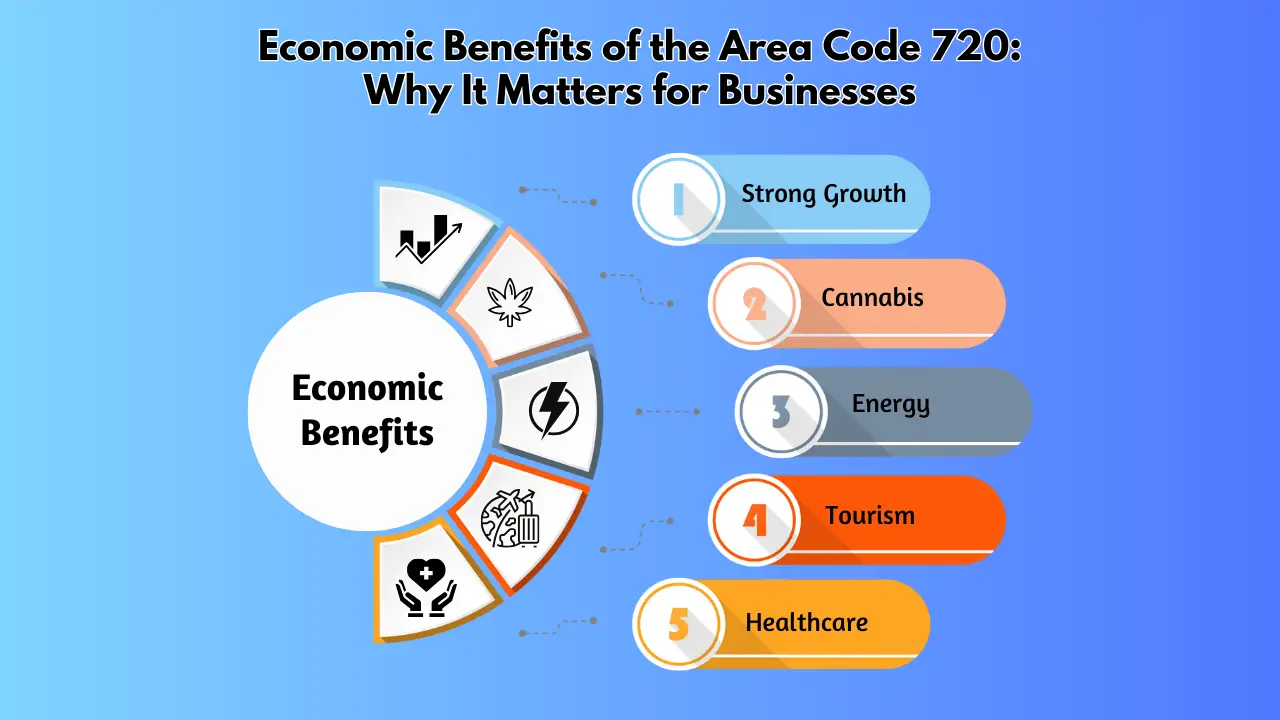
Major Industries
The Denver area served by 720 is a hub for numerous key industries:
- Technology: Known as “Silicon Mountain,” the region boasts a high concentration of tech startups and established companies, particularly in software, telecommunications, and IT services. Cities like Boulder and Broomfield are significant tech centers.
- Aerospace & Defense: Colorado has a major aerospace cluster, with numerous companies involved in satellites, launch systems, and defense contracting located within the 720 footprint.
- Healthcare: Denver is a regional center for healthcare services and research, with major hospital systems and biotechnology firms.
- Tourism & Hospitality: Proximity to the Rocky Mountains fuels a robust tourism industry, supporting hotels, restaurants, and recreational businesses.
- Energy: While encompassing renewables, the region also has a significant traditional energy sector presence.
- Craft Beer & Cannabis: Denver and Boulder are national leaders in the craft brewing and legal cannabis industries, contributing significantly to the local economy and culture.
The presence of these varied and often high-growth industries creates a dynamic economic ecosystem, fostering innovation and providing ample opportunities for B2B and B2C businesses.
Business Environment
The business environment within the 720 area code is characterized by:
- Strong Growth: The Denver metro area consistently ranks among the fastest-growing regions in the US.
- Educated Workforce: High levels of educational attainment provide businesses with access to a skilled talent pool.
- Strategic Location: Denver’s central location in the US and Denver International Airport (DEN) make it a key logistics and transportation hub.
- Quality of Life: The attractive lifestyle, including outdoor recreation and cultural amenities, helps businesses attract and retain employees.
- Supportive Ecosystem: Various government initiatives and private organizations support entrepreneurship and business development.
Using a 720 number helps businesses tap into this favorable environment, signaling local commitment and facilitating connections within this active market.
How to Get a 720 Area Code Number
Securing a phone number with the Denver-centric 720 area code is straightforward for both businesses and individuals. The process typically involves choosing a service provider and selecting a suitable plan.
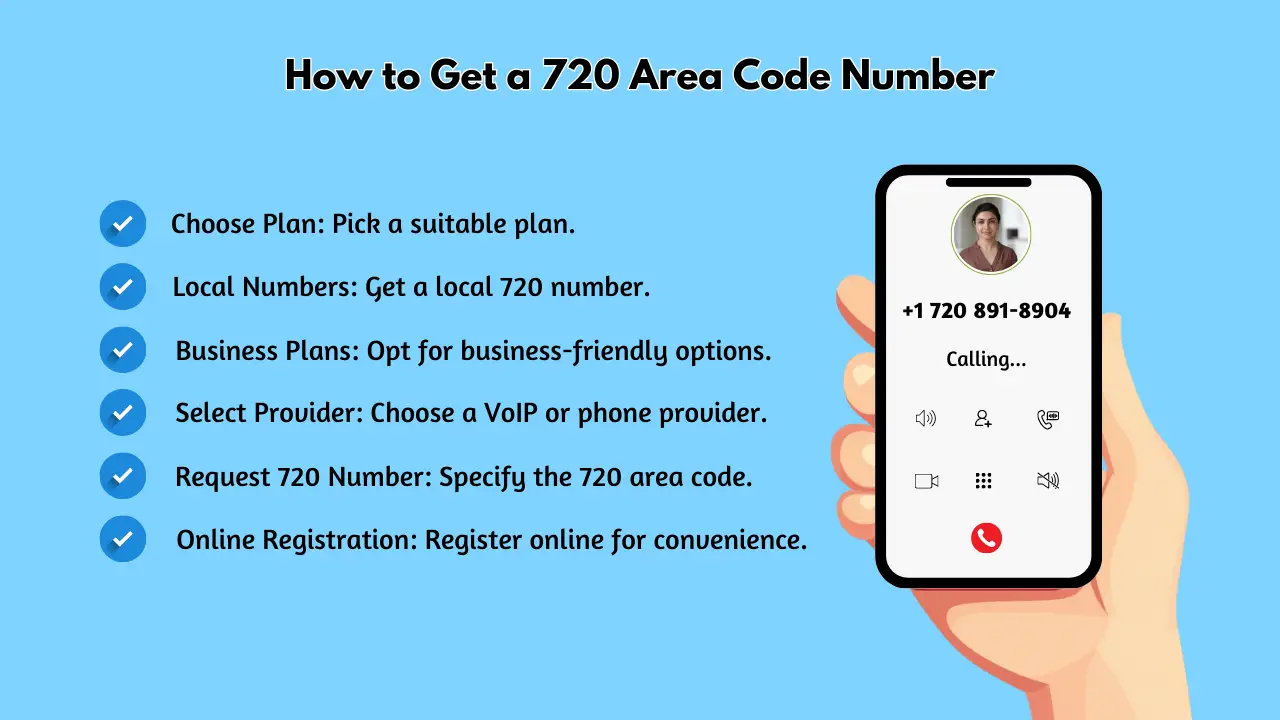
Step-by-Step Process for Businesses and Individuals
For Individuals:
- Contact Your Preferred Phone Service Provider: This could be a major mobile carrier or a landline/VoIP provider.
- Request a 720 Number: When setting up new service or adding a line, specify your preference for the area code 720.
- Check Availability: The provider will confirm if 720 numbers are available. Due to the overlay with 303 and 983, numbers might be offered from any of these three codes for the same location. Be specific if 720 is desired.
- Complete Setup: Follow the provider’s steps to activate your new number. You might also be able to port an existing number from another provider into the 720 area if you are moving or changing services.
For Businesses:
- Choose a Business Phone Service Provider: Options range from traditional carriers to modern VoIP and UCaaS providers (like RingCentral, Vonage, Nextiva, or specialized local providers).
- Select a Plan: Business plans often offer features like multiple lines, virtual receptionists, call forwarding, and analytics. Ensure the plan includes the option to choose local numbers.
- Request a 720 Phone Number: Specify 720 during sign-up. Many providers offer searchable databases of available numbers, potentially including vanity numbers. You might also request sequential numbers for multiple lines. Again, be aware you might be offered 303 or 983 numbers as well.
- Configure Your System: Set up your phone system (physical phones, softphones, mobile apps) according to the provider’s instructions and begin using your 720 number.
Why Choose TKOS for Your 720 Area Code Number?
When selecting a provider for your 720 number, consider platforms that offer reliability, flexibility, and strong customer support. Look for features like:
- Seamless Integration: Easy setup and management with existing tools.
- Cross-Device Functionality: Manage calls and messages from anywhere.
- Competitive & Transparent Pricing: Clear billing without hidden costs.
- Robust Security: Protection for your communications and data.
- Dedicated Support: Assistance available when you need it.
Choosing the right provider ensures your 720 number effectively supports your communication needs in the dynamic Denver market.
Area Code Overlay and Relief Planning
The Denver metro area provides a clear example of how overlay plans are used to manage the demand for phone numbers in high-growth regions.
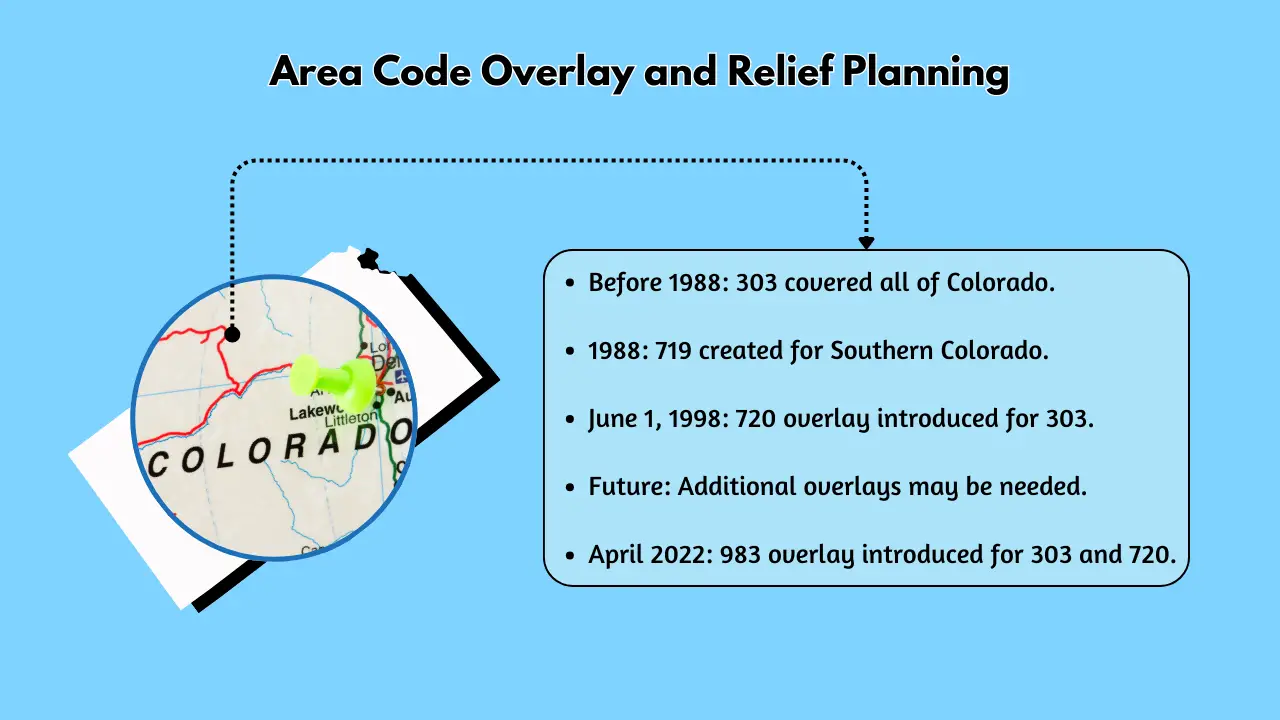
Previous Area Code Changes
- Before 1988: 303 covered all of Colorado.
- 1988: 719 was created for Southern Colorado (Colorado Springs, Pueblo).
- 1995: 970 was created for Northern and Western Colorado (Fort Collins, Grand Junction). 303 was now mostly confined to the Denver-Boulder metro area.
- June 1, 1998: 720 was introduced as an overlay for the 303 area code due to rapid number exhaustion. This mandated 10-digit dialing for all local calls in the region.
- April 2022: 983 was introduced as a second overlay covering the same geographic area as 303 and 720, again due to continued demand.
This history illustrates the ongoing need for numbering relief in response to population increases and technological proliferation (cell phones, IoT devices). Overlays became the preferred method over geographic splits to avoid the disruption of forcing existing customers to change their numbers.
Future Considerations
Given the Denver area’s sustained growth, further numbering relief might be necessary in the future. NANPA (North American Numbering Plan Administrator) continually monitors number utilization. While the addition of 983 provided significant relief, future possibilities could include:
- Allocation of another overlay code if 303/720/983 resources become scarce.
- Technological shifts (like increased adoption of non-geographic numbers or changes in how numbers are assigned) could influence future planning.
Clear communication with residents and businesses about dialing procedures and the reasons for changes remains crucial during any future transitions.
Integrating Area Code 720 into Modern Communication Systems
The 720 area code integrates seamlessly into modern communication technologies, supporting businesses and individuals across the Denver metro area.
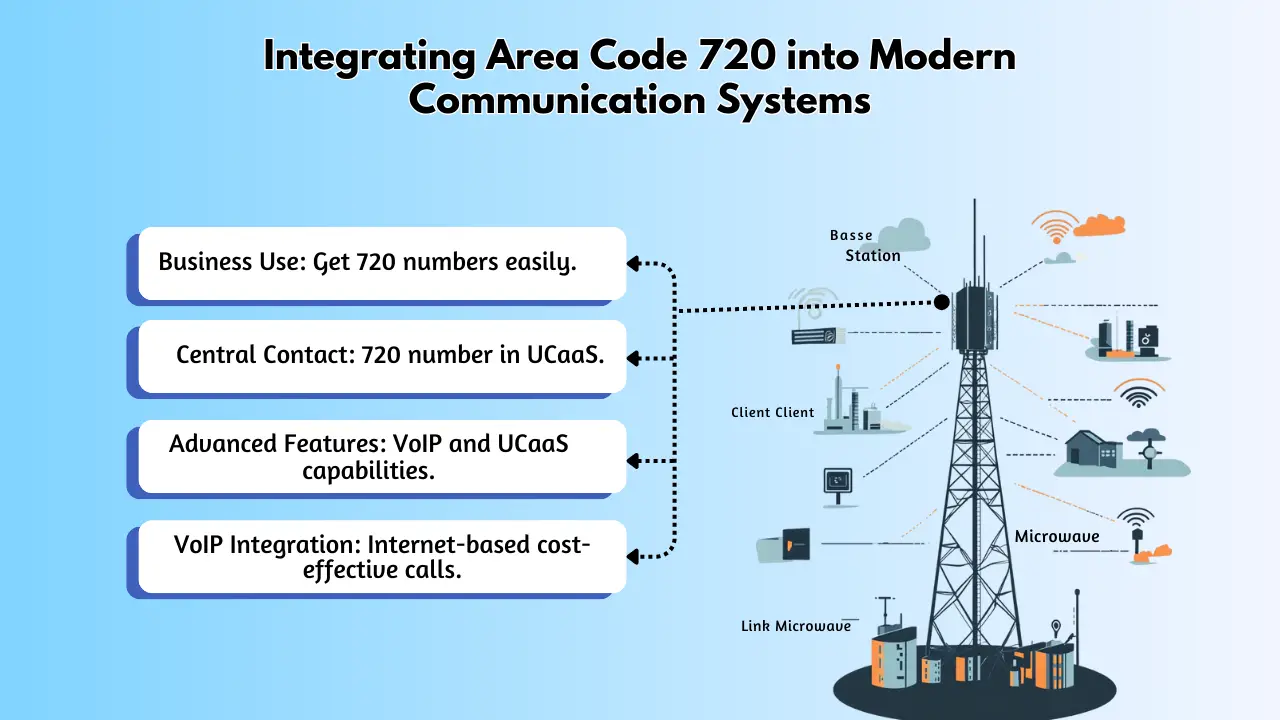
Technological Integration
Area code 720 functions perfectly with contemporary systems like VoIP (Voice over Internet Protocol) and UCaaS (Unified Communications as a Service) platforms.
- VoIP: Allows calls over the internet, offering flexibility, cost savings, and advanced features. Businesses can easily obtain 720 numbers through VoIP providers.
- UCaaS: Combines voice, video, messaging, and collaboration tools into a single platform, enhancing productivity. A 720 number can be the central point of contact within a UCaaS system.
These technologies make it easy to establish a local presence with a 720 number, regardless of physical location, while leveraging advanced communication capabilities.
Coverage Area
As an overlay, 720 covers the identical geographic territory as 303 and 983, encompassing the core Denver metropolitan area and surrounding cities like Boulder, Aurora, Lakewood, and more. This ensures broad reach within one of the nation’s most economically active regions.
Benefits for Businesses
Utilizing a 720 number via modern systems allows businesses to:
- Establish Local Credibility: Signal a presence in the thriving Denver market.
- Enhance Customer Reach: Make it easier for local customers to connect.
- Improve Efficiency: Leverage features of VoIP/UCaaS for better call management and team collaboration.
- Maintain Flexibility: Manage communications from anywhere, supporting remote and hybrid work models common in the Denver tech scene.
The adaptability of the area code 720 ensures its continued relevance in today’s interconnected world.
Cultural and Social Aspects
The 720 area code is interwoven with the unique cultural and social fabric of the Denver metropolitan area and the Colorado Front Range.
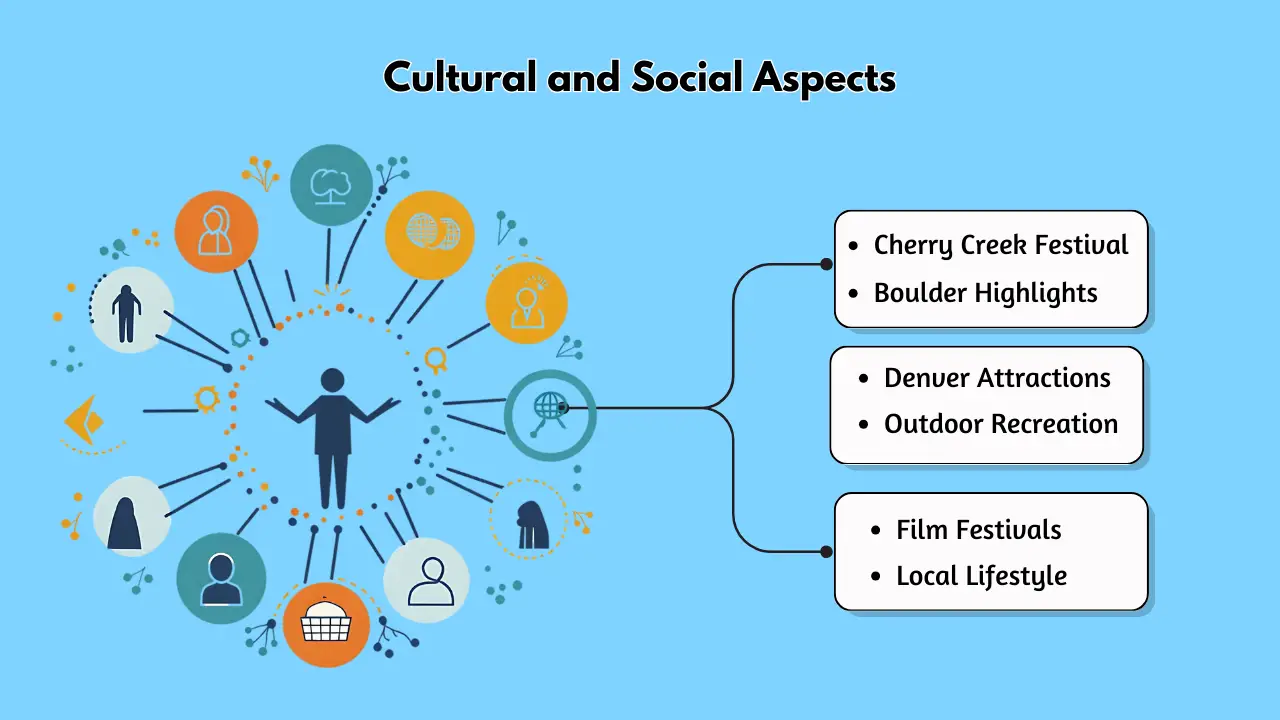
Local Attractions
The region served by 720 is rich in attractions:
- Denver: The “Mile High City” boasts attractions like the Denver Art Museum, the historic Union Station, the vibrant RiNo Art District, professional sports venues (Empower Field at Mile High, Ball Arena), and numerous parks.
- Boulder: Known for the iconic Flatirons rock formations, the Pearl Street Mall (a pedestrian hub of shops and restaurants), and the University of Colorado campus.
- Red Rocks Amphitheatre: A world-renowned concert venue built into stunning natural rock formations near Morrison.
- Rocky Mountain Proximity: Easy access to hiking, skiing, and mountain towns offers unparalleled outdoor recreation opportunities, defining the local lifestyle.
Notable Events
The 720 area hosts countless events reflecting its diverse interests:
- Great American Beer Festival: A major annual event showcasing brewers from across the nation.
- Cherry Creek Arts Festival: A popular summer event featuring visual, culinary, and performing arts.
- Professional Sports: Home games for the Denver Broncos (NFL), Denver Nuggets (NBA), Colorado Avalanche (NHL), Colorado Rockies (MLB), and Colorado Rapids (MLS) draw large crowds.
- Music & Film Festivals: Numerous events like the Underground Music Showcase (UMS) in Denver and the Boulder International Film Festival celebrate creative arts.
Having a 720 number connects individuals and businesses to this lively cultural scene and the distinctive Colorado way of life.
Technical Details Of Area Code 720
Understanding the administration and potential challenges associated with the area code 720 provides insight into the complexities of modern telecommunications.
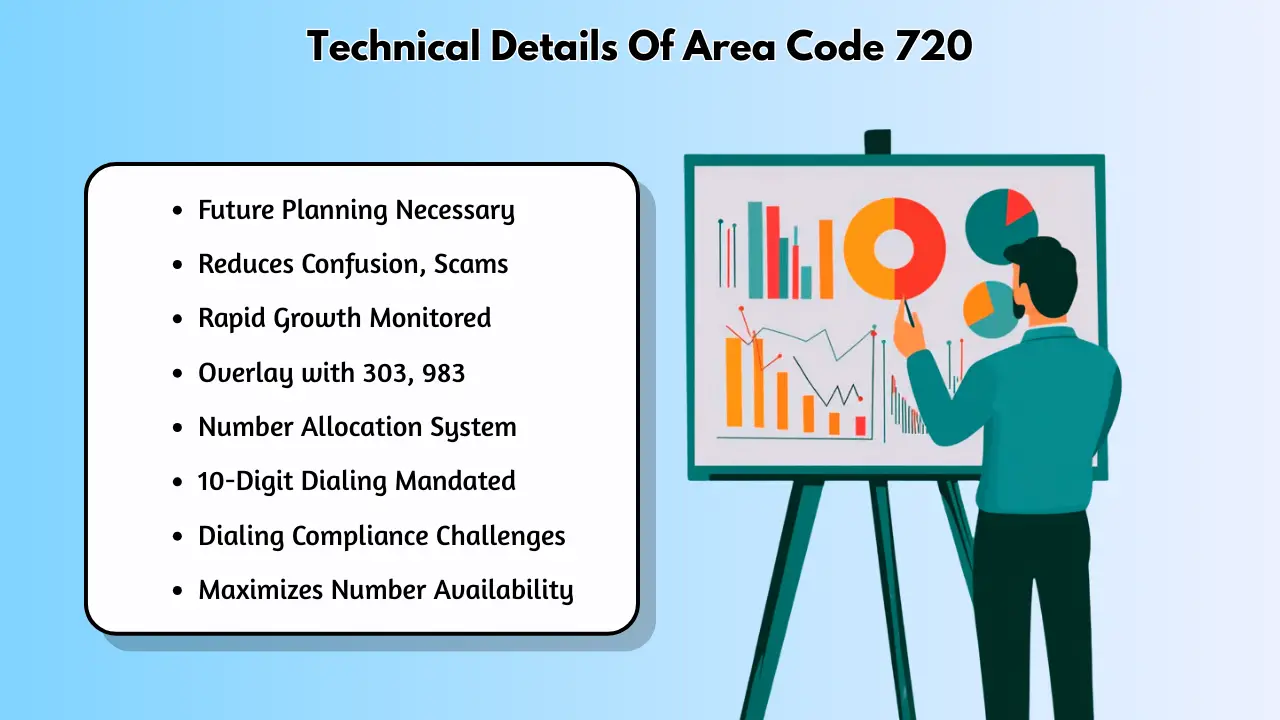
Numbering Plan Administration
Area code 720 is administered by NANPA under an overlay plan alongside 303 and 983.
- Overlay Structure: All three area codes serve the same geographic territory. This necessitates mandatory 10-digit dialing (area code + seven-digit number) for all local calls within this region. You cannot dial just seven digits, even if calling someone with the same area code.
- Number Allocation: NANPA assigns blocks of numbers within the 720 code (and 303/983) to various telecommunications carriers, who then assign them to customers.
This overlay system maximizes number availability but requires consistent dialing habits from users.
Issues and Challenges
- 10-Digit Dialing Adaptation: While mandatory since 1998, ensuring universal understanding and compliance with 10-digit dialing for local calls remains important, especially for newcomers or visitors.
- Number Exhaustion: Despite the addition of 720 and 983, the rapid growth in the Denver area means that number availability is constantly monitored. Efficient allocation and potential future relief planning are ongoing necessities.
- Public Awareness: Educating the public about the coexistence of three area codes (303, 720, 983) serving the same area helps prevent confusion.
Managing these technical aspects ensures the smooth functioning of telecommunications across this busy metropolitan region.
The Future of the Area Code 720: What’s Next for Denver’s Phone Systems?
The 720 area code, along with 303 and 983, will continue to be central to communication in the ever-evolving Denver metropolitan area.
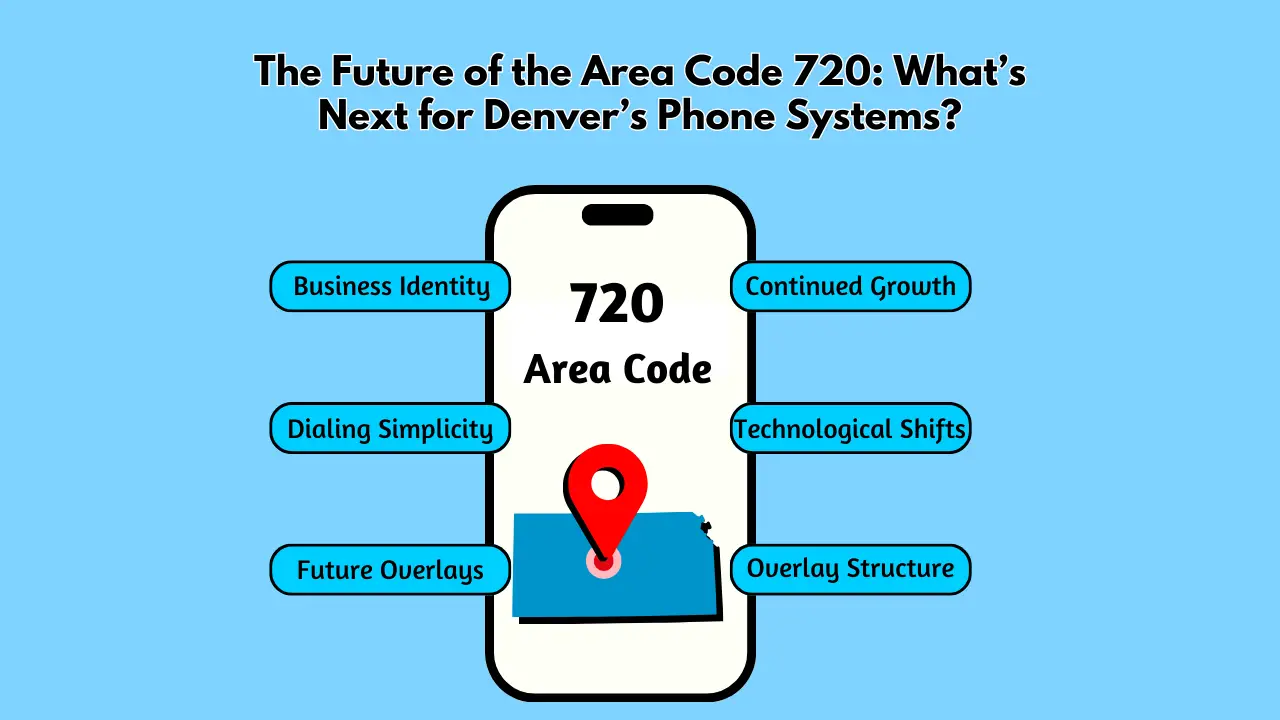
Anticipated Trends:
- Continued Growth: Denver’s popularity and economic strength suggest ongoing demand for phone numbers. The 303/720/983 overlay structure is designed to handle this for the foreseeable future.
- Technological Integration: Expect deeper integration with mobile technology, IoT devices requiring numbers, and advanced VoIP/UCaaS solutions. The way numbers are used may continue to shift.
- Potential Future Overlays: While 983 provided significant relief, long-term planning might eventually necessitate discussions about adding another overlay code if growth outpaces projections decades down the line.
Challenges and Considerations:
- Managing Resources: Efficiently allocating numbers across three codes while planning for long-term needs is a key task for regulators and carriers.
- Maintaining Simplicity: Ensuring dialing patterns remain understandable for residents amidst technological changes is crucial.
- Business Identity: For businesses, maintaining a consistent local identity associated with these area codes remains important, even as communication methods evolve.
The future will likely involve adapting numbering resources to meet the demands of new technologies and a growing population, ensuring the Denver area remains well-connected.
Conclusion
The 720 area code stands as a testament to the growth and dynamism of the Denver metropolitan area. Introduced in 1998 as an overlay to the venerable 303 code, and now coexisting with the 983 overlay, it has been crucial in expanding telecommunication capacity for cities like Denver, Boulder, Aurora, and Lakewood.
Serving a region known for its economic vitality across technology, aerospace, tourism, and more, the area code 720 helps businesses establish local credibility and connect with a thriving market. It’s more than just a number; it’s a link to the vibrant culture, stunning natural environment, and innovative spirit of Colorado’s Front Range.
As communication technologies evolve, the area code 720 remains seamlessly integrated, supporting everything from traditional landlines to advanced VoIP and mobile services. It reflects the area’s ability to adapt and grow, connecting people and opportunities across this key metropolitan hub.
Frequently Asked Questions
The 720 region covers the Denver metropolitan area and surrounding communities, including Denver, Boulder, Aurora, Lakewood, Littleton, Englewood, Centennial, Broomfield, Longmont, and parts of adjacent counties. It shares this exact geographic area with the 303 and 983 area codes.
You can request a 720 number from most phone service providers (mobile, landline, VoIP) when setting up a new line or service in the Denver metro area. Availability might vary, and you could also be offered a 303 or 983 number for the same location.
The 820 area code was created in 2018 as an overlay for the area code 805 because the demand for phone numbers, fueled by population growth and new technologies, was exhausting the available numbers in the original 805 code. The overlay allowed for number expansion without requiring existing users to change their 805 numbers.
No, 805 is the original area code. However, it has an overlay code, which is 820. Both 805 and 820 serve the identical geographic territory on the Central Coast, and mandatory 10-digit dialing is required for all local calls.
Yes, significantly. An 805 number provides instant local recognition and credibility within the valuable Central Coast market. It signals to customers that a business is local, fostering trust and potentially increasing engagement within this region known for tourism, agriculture, and a high quality of life.

